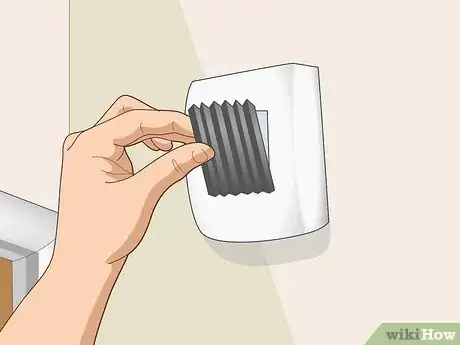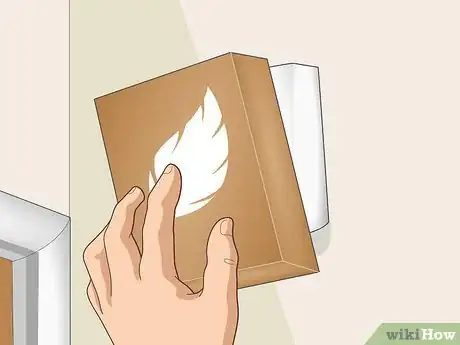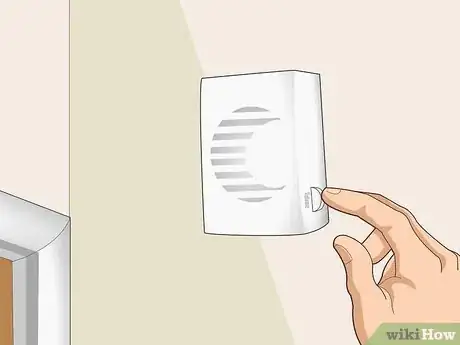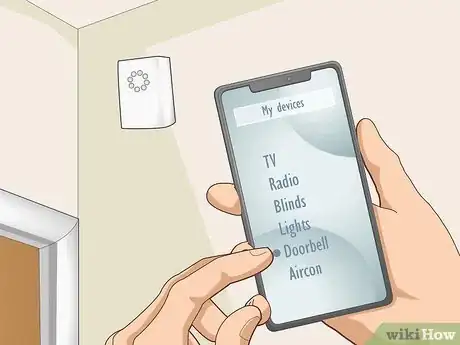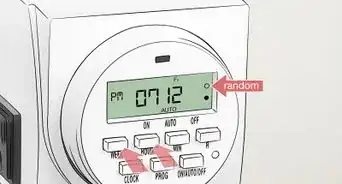This article was co-authored by wikiHow staff writer, Eric McClure. Eric McClure is an editing fellow at wikiHow where he has been editing, researching, and creating content since 2019. A former educator and poet, his work has appeared in Carcinogenic Poetry, Shot Glass Journal, Prairie Margins, and The Rusty Nail. His digital chapbook, The Internet, was also published in TL;DR Magazine. He was the winner of the Paul Carroll award for outstanding achievement in creative writing in 2014, and he was a featured reader at the Poetry Foundation’s Open Door Reading Series in 2015. Eric holds a BA in English from the University of Illinois at Chicago, and an MEd in secondary education from DePaul University.
There are 7 references cited in this article, which can be found at the bottom of the page.
This article has been viewed 27,328 times.
Learn more...
If that loud ringing sound shooting out of your doorbell is giving you a headache, it may be time to take action. Unfortunately, most of those old school wired doorbells and intercoms do not have a volume control. Short of completely replacing the chime, there is no way to adjust how loud it is when someone presses the button outside of your door. You may be able to muffle the sound though, so don’t give up hope just yet. Adjusting the volume on a wireless doorbell, like a Ring, is typically pretty easy since these doorbells have digital volume controls.
Steps
Muffling the Volume on a Wired Doorbell
-
1Locate the chime on your wall by looking for a plastic cover or intercom. If you have an old school doorbell, there is a chime located somewhere in your home. Look for a plastic box that is roughly 4 by 6 inches (10 by 15 cm) or so. These boxes are typically located near your door, close to the ceiling, but it may be in your living room, kitchen, or some other common area.[1]
- If you have an intercom system, the chime likely comes out of the grill right above the buttons on the intercom itself. Pay attention the next time your doorbell rings. If it sounds like it’s coming from the intercom, your chime is built-in next to the “speak” and “listen” buttons.
- A wired doorbell refers to any doorbell that relies on your home wiring. There is a literal wire running from the doorbell outside to the chime inside. These doorbells never have volume control settings.
-
2Press duct tape over the openings on the chime to muffle the sound. Inspect the sides, top, and front of your chime. There will be a small vent or opening somewhere on the chime to let the sound out. An easy way to lower the volume of the doorbell is to just put a piece of duct tape over the opening or vent. This will muffle the sound a little without completely silencing the doorbell.
- On an intercom, you can put the duct tape over the grill to reduce the volume. You won’t be able to hear or speak into the intercom, though. Unfortunately, there aren’t very many good solutions when it comes to lowering the volume of the chime on intercoms.
Advertisement -
3Tape acoustic foam over the chime for a more aesthetically pleasing solution. Buy some acoustic foam online or from a music supply store. Cut the foam into a 1–2 in (2.5–5.1 cm) strip that matches the opening or vent on your chime. Use scissors or a utility knife to cut the foam. Then, peel off some double-sided tape and press it on your chime cover right next to the opening. Lay the foam over the tape so that it covers the vent or opening where the sound comes out.[2]
- If the chime is really loud, you can cover the entire plastic cover with acoustic foam if you’d like. This will reduce the sound even more dramatically. The sound is amplified by the openings on the cover, but it comes through the thin plastic case a little as well.
-
4Get a chime cover to insulate the sound and muffle it a little bit. A chime cover is a decorative piece of art designed to obscure the unpleasing plastic chime sitting on your wall. They will also lower the volume a little bit if you get a solid chime cover that doesn’t have a vent on it. Measure the length, width, and depth of your chime and buy a chime cover online. Simply hang it over the box on your wall to muffle the sound slightly.[3]
Variation: If you really want to get crafty, you can get a chime cover that is 3–5 inches (7.6–12.7 cm) bigger than your chime. Cut up some acoustic foam and tape it to the inside of the cover before placing it over the box on your wall. This will look quite good and dramatically mute the sound.
-
5Shut the fuse off for the doorbell to turn if off entirely. You can always turn the chime off. Go to your fuse box and look for the fuse labeled “doorbell” or “chime.” Flip the switch to the off position to keep your doorbell from going off at all. This may not be a permanent solution, but it’s a decent way to keep the doorbell from ringing if it’s really driving you crazy.
- If the chime only bothers you when it goes off at night or early in the day, just flip the fuse every night before you go to bed.
- If you want to keep the chime off permanently, put a small sign near the doorbell that says “please knock” to let people know the doorbell isn’t on.
- On rare occasions, the fuse for the doorbell may be linked to another electrical system in your house, such as your porch light or entryway outlets. If there are other electrical systems on the same circuit, you may not be able to do this without causing a headache for yourself.
-
6Install a wireless doorbell to control the volume of the chime. If you’re willing to do a little work to resolve this issue, buy a wireless doorbell. Most of the main brands (except Nest) have volume controls for the chime. Buy your wireless doorbell and follow the manufacturer’s instructions to install it in your home.[4]
- Most wireless doorbells are wired into your old chime. You turn the fuse off, remove the cover, take the old wires out, and attach the new doorbell to the chime. Then, you unscrew your old doorbell and wire in your new digital buttons.
- While Ring is undoubtedly the most popular brand of wireless doorbell, there are plenty of other options out there.
- You can always hire an electrician to install the doorbell for you if you don’t want to mess with the electrical wires in your home.
Adjusting the Chime on a Wireless Doorbell
-
1Open the app or control panel for your wireless doorbell. Almost every wireless doorbell has adjustable volume settings. If you control your doorbell through an app on your phone or computer, open it on your device. If you have a digital control panel in your home, use that to access your settings. If you can’t figure out how you control your doorbell, consult your instruction manual or call the company that you bought the doorbell from.[5]
- The only major brand of wireless doorbell that doesn’t have adjustable volume is Nest. There are currently no volume controls for the Nest chimes, but you can change the volume of the speaker by pressing the “lower volume” button on the back of the control panel.[6]
-
2Select your device to pull up the settings for your doorbell. In your app or control panel, there are likely several devices you can select. You may see your speaker, the intercom, the app settings, or some other devices. Select or highlight the doorbell to open the settings for it.[7]
Variation: On some wireless doorbells, there is a small gear in the top right of the screen. If you can’t select a specific device, press the gear to open the general settings for your doorbell system.
-
3Adjust the volume slider for the doorbell to lower it. Once you’ve opened the settings for the doorbell, look for the volume slider. Move it to the left to lower the volume of the chime. Every doorbell has different values for the volume, so keep the app open to make adjustments while you test it.[8]
- Many wireless doorbells have a mute function as well. If you don’t want the doorbell going off late at night you can open the app or settings on the control panel and simply set the volume to 0.
-
4Test your doorbell to see how it sounds and make adjustments as needed. Once you’ve adjusted the volume, go outside to your doorbell. Leave the door open so you can hear how it will sound from inside. Press your doorbell and listen to the chime. If it’s too quiet, turn the volume up a little. If it’s still too loud, turn it down even further.[9]
- You can always enlist some help and have one person stay inside while you check the doorbell from outside. This will give you a better sense for what the chime sounds like inside and outside.
Things You’ll Need
Muffling the Volume on a Wired Doorbell
- Duct tape
- Acoustic foam
- Scissors or utility knife
- Double-sided tape
- Chime cover
References
- ↑ https://youtu.be/20pM5pkVQQ4?t=26
- ↑ https://www.popularmechanics.com/home/interior-projects/how-to/g2470/soundproofing-a-room/
- ↑ https://youtu.be/wVj1ImN7N_k?t=262
- ↑ https://support.ring.com/hc/en-us/articles/115001773266-Setting-Up-Your-Ring-Video-Doorbell-In-the-Ring-App
- ↑ https://youtu.be/0kD_TOeqSVk?t=14
- ↑ https://support.google.com/googlenest/answer/7072489?hl=en
- ↑ https://community.ring.com/t5/Accessories/How-To-Adjust-Chime-and-Chime-Pro-Volume/td-p/425
- ↑ https://community.ring.com/t5/Accessories/How-To-Adjust-Chime-and-Chime-Pro-Volume/td-p/425
- ↑ https://community.ring.com/t5/Accessories/How-To-Adjust-Chime-and-Chime-Pro-Volume/td-p/425


